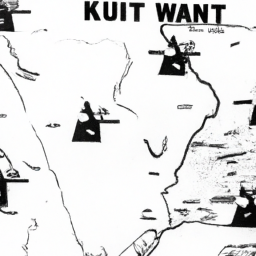In August 1990, Saudi Arabia found itself in a state of fear and vulnerability as Iraq, under the leadership of Saddam Hussein, made a bold move by invading its neighboring country, Kuwait. This sudden invasion sent shockwaves throughout the Middle East and raised concerns about Iraq's expansionist ambitions.
Saddam Hussein's threats to invade Saudi Arabia further fueled the anxiety within the Saudi government and its citizens. The prospect of a full-scale invasion by Iraq raised fears of a potential loss of sovereignty and control over their own territory. The instability in the region posed a direct threat to Saudi Arabia's security and stability.
Furthermore, Iraq's strategic plans to seize control of all Middle Eastern oil deposits added another layer of fear for Saudi Arabia. As one of the world's largest oil producers, Saudi Arabia's economy heavily relies on its oil exports. The possibility of Iraq taking over these crucial resources posed a significant threat to Saudi Arabia's economic well-being.
The loss of Kuwait to Iraq also exacerbated Saudi Arabia's concerns. The invasion of Kuwait not only highlighted Iraq's aggressive military capabilities but also demonstrated its willingness to use force to achieve its territorial ambitions. Saudi Arabia recognized the need to act swiftly and decisively to prevent a similar fate from befalling them.
The Saudi government, in collaboration with the international community, worked to build a coalition to counter Iraq's aggression. The United States played a crucial role in leading the coalition forces and providing support to Saudi Arabia in defending its borders. The collective effort to deter Iraq's advances helped alleviate some of the fears gripping the region.
The Gulf War that ensued in 1991 further solidified Saudi Arabia's fears and highlighted the importance of maintaining regional stability and security. The conflict underscored the need for strong alliances and cooperation among Middle Eastern countries to counter external threats and safeguard their interests.
Despite the challenges and uncertainties that arose from the Gulf War, Saudi Arabia emerged from the crisis with a renewed sense of resilience and determination. The experience of facing Iraq's aggression in 1990 served as a wake-up call for Saudi Arabia to bolster its defenses and strengthen its alliances to ensure its security in the future.
In conclusion, the events of 1990 served as a stark reminder of the dangers posed by Iraq's aggressive actions and expansionist ambitions. Saudi Arabia's fears of Iraq's intentions were well-founded, and the experience of confronting this threat highlighted the need for vigilance and cooperation in safeguarding regional security and stability.
